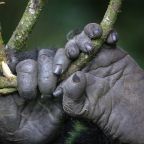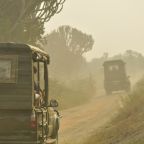Essential Uganda Travel Safety Tips for a Worry-Free Journey
Planning to visit Uganda, the Pearl of Africa? This stunning country offers unforgettable wildlife safaris, vibrant cultural heritage, and warm hospitality. But like any international destination, Uganda has its own set of safety challenges. Understanding these risks and taking necessary precautions will ensure a seamless and worry-free experience. This detailed guide offers expert Uganda travel safety tips, directly from Hillary, a trusted local guide and wildlife photographer, known for organizing authentic and safe experiences across Uganda.
From staying safe in national parks to understanding local laws and preparing for rural travel, this article covers everything you need to travel confidently. Let’s explore how to make your Uganda adventure both thrilling and safe.
1. Understanding Uganda’s General Safety Landscape
Uganda is often described as peaceful and welcoming, but foreign visitors must remain informed about political dynamics and security developments. While Uganda is safer than neighboring South Sudan and the Democratic Republic of Congo, it still faces regional and internal security issues. These include sporadic clashes near border areas and occasional political unrest in major cities.
The Ugandan government is known for tight control over internal security. However, visitors should still exercise increased caution, especially around government buildings, public gatherings, or demonstrations. While protests are not an everyday occurrence, when they do happen, they can escalate quickly and involve tear gas, rubber bullets, or clashes with security forces.
Local tour guides like Hillary monitor such developments closely and adjust itineraries to avoid risky areas. Booking your trip with Hillary Uganda Trips ensures you travel with someone who understands Uganda’s safety landscape and responds swiftly to emerging threats.
2. Entry Requirements: Visa and Vaccination
Most foreign visitors need a visa to enter Uganda. Thankfully, Uganda offers an easy-to-navigate visa online application system. Applicants must provide their passport, a recent photo, and proof of accommodation. Applying early—at least two weeks in advance is highly recommended to avoid delays.
Another critical entry requirement is the yellow fever vaccination. Travelers without a valid yellow fever certificate may be denied entry at Entebbe International Airport. This is strictly enforced due to Uganda’s proximity to other high-risk regions where yellow fever is endemic. A small yellow card issued by certified medical authorities serves as your proof.
In addition to yellow fever, travelers should also be aware of risks like ebola virus outbreaks and other severe diseases. During such times, airport officials may screen passengers for fevers or visible signs of illness. Hillary’s guests are always informed in advance if health-related travel advisories are active.
3. Health and Medical Safety in Uganda
Uganda’s healthcare infrastructure varies greatly between urban and rural settings. Medical facilities in major cities such as Kampala or Mbarara are fairly equipped for routine treatments, but they lack advanced resources for critical care or surgeries. Travelers with existing conditions or seeking peace of mind should have access to a medical evacuation plan as part of their travel insurance.
In rural areas, clinics may be rudimentary, lacking equipment and specialized staff. This makes preventive health care crucial. Before traveling, consult your doctor about vaccinations for hepatitis, typhoid, and rabies. Malaria is a significant risk, and Hillary strongly recommends taking antimalarial medication and packing strong insect repellent.
Be alert for symptoms like fever, fatigue, and muscle pain, especially after safari excursions. These can indicate malaria, dengue, or exposure to an infectious person. Tour groups organized by Hillary are briefed on how to prevent illness, avoid contaminated water, and respond promptly to health concerns.
4. Wildlife Safety in National Parks
Uganda’s renowned national parks such as Bwindi Impenetrable National Park and Queen Elizabeth National Park offer world-class wildlife viewing. However, the presence of wild animals means that visitors must adhere strictly to safety guidelines. You are entering the animals’ territory and disturbing them even unintentionally can provoke aggression.
Wildlife can also be carriers of infected animals such as rabid monkeys or anthrax-infected herbivores. Avoid touching any animal or bird, especially if it’s behaving strangely or appears injured. All tours guided by Hillary include safety briefings with appropriate security measures to ensure minimal risk.
Visitors should never attempt self-guided walks in the parks. Always stay in designated safari vehicles or with an armed ranger. Hillary’s gorilla trekking and birdwatching tours follow the latest protocols from local authorities to keep you and the animals safe and undisturbed.
5. Local Laws and Cultural Sensitivity
Uganda enforces a complex set of local laws that foreign visitors must respect. These include restrictions on illegal drugs, photography of government buildings, and attire in sacred places. Breaking these laws can lead to fines, deportation, or imprisonment.
Some laws are significantly stricter than in Western nations. For example, the death penalty may apply in cases of treason or aggravated homosexuality. Topics like same sex relationships or promoting homosexuality are extremely sensitive. Even public displays of affection can lead to police involvement or public hostility.
Visitors are also advised to dress modestly, especially in rural areas and religious sites. Wearing camouflage clothing is prohibited as it may be mistaken for military attire. Hillary’s team always provides guidance on dress and behavior to ensure travelers remain in good standing with the local population.
6. LGBTQ+ Travelers: Exercise Caution
Travelers identifying as LGBTQ+ should be aware that Uganda criminalizes same sex relations and perceived promoting homosexuality. In recent years, laws around this issue have become increasingly severe, with penalties including imprisonment and social stigma.
Public expressions of sexual orientation or activism can result in arrest or expulsion. Foreign nationals have been detained or deported simply for advocating LGBTQ+ rights. This makes Uganda a high-risk destination for LGBTQ+ travelers.
If you are traveling with a partner, discretion is strongly advised. Hillary provides safe, private accommodations and itinerary options that reduce exposure to discriminatory environments, allowing travelers to explore comfortably within cultural boundaries.
7. Petty Crime and Personal Belongings
While violent crime is less common in tourist areas, petty crime remains a concern. Incidents like bag-snatching, pickpocketing, and phone theft often occur in crowded areas or during late-night travel in major cities.
Visitors should avoid carrying large sums of cash or wearing flashy jewellery. Use money belts or concealed travel wallets. All safaris organized by Hillary include secure transportation, vetted lodges, and safe storage options.
When exploring urban areas, remain aware of your surroundings. If you need help, seek assistance from local authorities or ask Hillary’s team. Avoid walking alone at night and always opt for a licensed driver or trusted tour operator.
8. Road Travel and Driving Safety
Uganda’s roads range from newly paved highways to deeply rutted dirt roads. Road safety is a contributing factor to travel risks, especially in districts north and remote parts of western Uganda. Driving yourself is discouraged due to local hazards and variable enforcement of local traffic laws.
Travelers must hold an international driving permit in addition to their national license. However, poor signage, aggressive drivers, and wandering livestock increase accident risks. Night driving is particularly dangerous due to the lack of lighting and the possibility of armed criminals or roadblocks.
Traveling with a local driver or guide like those on Hillary’s safaris removes these concerns. His team ensures that all transport is reliable, insured, and equipped for emergency support.
9. Public Transport and Cross-Border Travel
Ugandan public transport, including matatus (minibuses) and boda-bodas (motorbike taxis), is widely used but not always safe. Overcrowding, speeding, and poor vehicle maintenance are common issues. Some boda-boda riders don’t carry extra helmets, posing serious injury risks.
Foreign visitors are advised to avoid these modes unless organized by their safari operator. Hillary offers comfortable, insured private transport with professional drivers, reducing your exposure to high-risk public options.
Crossing into the border with the Democratic Republic or South Sudan is strongly discouraged. These regions experience cross border attacks, unrest, and active armed groups. Stick to government-approved entry points and avoid unauthorized crossings entirely.
10. Safety in Shopping Areas and Ticket Offices
When shopping in Uganda’s vibrant markets or visiting attractions, always purchase from official ticket offices or verified sources. Fake tickets, inflated prices, and counterfeit goods are common scams aimed at foreign nationals.
Be especially careful in shopping centres, where pickpockets often target tourists distracted by their surroundings. Avoid counting money in public or displaying your wallet. Hillary arranges private market visits with local traders and can help you negotiate fairly and safely.
It’s also important to avoid being too generous with street vendors or beggars, as it can attract larger crowds and compromise your safety. Polite refusals are generally respected.
11. Political Events and Public Gatherings
Uganda’s political climate can be unpredictable. Political events, rallies, and opposition demonstrations may appear peaceful but can escalate rapidly. The use of tear gas or rubber bullets by security forces is common, particularly in major cities like Kampala.
Avoid participating in or photographing any political gathering. Doing so may lead to police questioning or confiscation of your equipment. Hillary’s guests are always informed about upcoming political events that might affect their itineraries and are guided to safer alternative activities.
If you unexpectedly encounter a rally or protest, move away immediately and seek shelter in a secure building or vehicle. Avoid engaging with the crowd or security forces. Safety in such situations depends heavily on proper planning and local awareness.
12. The Role of Local Media and Information
Staying updated through local media sources while in Uganda is essential for safety. Newspapers and radio stations often carry announcements about road closures, violent crime, disease outbreaks, or upcoming strikes.
However, some media channels may be politically biased or unreliable. Hillary recommends trusted local news outlets and provides daily updates to his guests. This helps travelers make informed decisions and avoid areas experiencing tension or increased risk.
International visitors should avoid sharing political opinions online, especially criticisms of the government. Authorities monitor social media, and critical posts can result in legal complications for foreign visitors.
13. Food and Water Safety Tips
Ugandan cuisine is delicious and diverse, but precautions are necessary to avoid foodborne illnesses. Never eat raw or undercooked meats and avoid unpeeled fruits or uncooked vegetables unless washed in bottled water.
Only drink sealed bottled water and avoid ice cubes, as they are often made with tap water. Hillary’s tours always provide safe drinking water and meals from vetted restaurants and safari lodges.
Travelers should also bring anti-diarrheal medication and consult with a travel health specialist before arrival. Common hygiene practices like frequent handwashing or using sanitizer are simple yet effective ways to stay healthy.
14. Insects and Infectious Disease Prevention
In Uganda, mosquitoes transmit diseases such as malaria and yellow fever. Other insect-borne illnesses like dengue and sleeping sickness also pose risks in certain regions. Insect repellent containing DEET is essential for all travelers.
Wear long sleeves and pants, especially during evenings and in wet or forested areas. All accommodations arranged by Hillary provide mosquito nets and conduct routine fumigation to reduce insect exposure.
Avoid contact with body fluids of others, especially in areas that may have experienced outbreaks of infectious person cases such as ebola virus. Hillary’s team monitors all health advisories and alerts travelers early.
15. LGBTQ+ Safe Accommodations and Travel Planning
For LGBTQ+ travelers, safety and discretion are key. Hillary works with lodges and hotels that are professional and non-discriminatory, offering peace of mind. His itineraries are curated to avoid socially conservative hotspots where same sex travelers might be at higher risk.
While many Ugandans are warm and respectful, some parts of the local population remain conservative. Hillary ensures that accommodations and activities are planned with cultural sensitivity and personal safety in mind.
Avoid displaying affection in public, and be cautious when discussing sexual orientation with strangers or locals. Discretion is not just safety—it’s a necessity in Uganda’s legal and social context.
16. Staying Safe During Gorilla Trekking and Nature Tours
Activities like gorilla trekking in Bwindi Impenetrable National Park or hiking near Lake Albert are highlights of any Ugandan trip. However, they also involve physical exertion, exposure to wildlife, and remote terrain. Travelers should be physically prepared and follow safety protocols strictly.
Gorilla permits are issued by official ticket offices and require a licensed guide. With Hillary, you trek under expert supervision, and his knowledge as a wildlife photographer adds depth to the experience. His treks maintain a safe distance from animals and adhere to environmental protection guidelines.
Hiking in remote parts of western Uganda may expose you to slippery trails, tropical storms during rainy seasons, and altitude sickness. Hillary’s treks include guides, porters, medical kits, and emergency contacts with the nearest police station or ranger posts.
17. High-Risk Areas to Avoid
While most of Uganda is safe, some areas are considered high risk due to rebel activity, armed groups, or general lawlessness. These include districts north of the country near the border with the Democratic Republic, where cross border attacks have occurred.
Avoid unnecessary travel to Karamoja, areas near South Sudan, and the Ituri forest region. These places are not recommended for tourists and may lack appropriate security measures or infrastructure.
If your itinerary includes these regions for academic or humanitarian purposes, inform your embassy and coordinate security with local authorities. Hillary does not operate tours in these zones due to the potential increased risk and unpredictability.
18. Interactions with Tribal Groups
Uganda is home to over 50 ethnic and tribal groups, each with unique customs, traditions, and languages. Visitors should approach these communities with respect, curiosity, and humility.
Photography requires permission. Some communities, especially in rural areas, may view photos as intrusive or disrespectful. Hillary arranges cultural visits that include ethical photography and genuine exchanges.
Gifts, when appropriate, should be simple and practical—avoid giving money directly. Instead, contribute to community tourism projects supported by Hillary’s travel network that benefit schools or cultural centres.
19. Emergency Contacts and Evacuation Plans
Always keep a list of emergency contacts: your country’s embassy, Hillary’s tour staff, local hospitals, and the nearest police station. If you’re traveling with Hillary, he provides guests with a 24/7 emergency number.
Invest in travel insurance that includes medical evacuation, especially if your trip involves remote safaris, hiking, or boating. Helicopter or air ambulance services are available but expensive without insurance.
Familiarize yourself with local SOS signals or common phrases like “Help me” or “Take me to hospital” in Luganda or Swahili. In serious emergencies, contact the U.S. Embassy in Kampala or your respective diplomatic mission.
20. Final Uganda Travel Safety Tips from Hillary
Traveling to Uganda doesn’t need to be stressful. With proper planning, cultural awareness, and guidance from a local expert like Hillary, you can have a safe and enriching experience. Whether it’s avoiding armed criminals, steering clear of illegal drugs, or being cautious about political tensions, your journey should be both respectful and well-informed.
Always exercise caution when interacting with strangers or accepting unsolicited help. Rely on licensed tour operators for all your arrangements. Hillary Uganda Trips ensures all staff are trained in safety, hospitality, and emergency response.
Ready to plan your safe and unforgettable Ugandan adventure? Contact Hillary now on WhatsApp or via email for expert advice, custom safari packages, and secure travel options.
Explore More with Hillary Uganda Trips
- 🦍 Best Gorilla Trekking Tours in Bwindi
- 🦓 Top Uganda Safari Lodges for a Safe Stay
- 🧳 Uganda Safari Packing List: Stay Safe and Ready
- 🧭 7-Day Uganda Safari Itinerary: Wildlife and Safety
- 🧍 Solo Travel in Uganda: How to Explore Safely
- 🧑🤝🧑 Batwa Cultural Experience – Ethical and Safe Encounters
Let’s Explore Uganda Together
Uganda is a breathtaking destination with endless adventure, but safety must always be part of your travel equation. With Hillary’s guidance and the essential Uganda travel safety tips above, you’ll not only stay safe, you’ll truly connect with the land, the people, and the magic of Africa.
For custom tours and up-to-date safety info, reach out via WhatsApp or email Hillary directly.
WhatsApp. +256726436969
📩 hillary@hillaryugandatrips.com
📸 https://hillaryugandatrips.com









